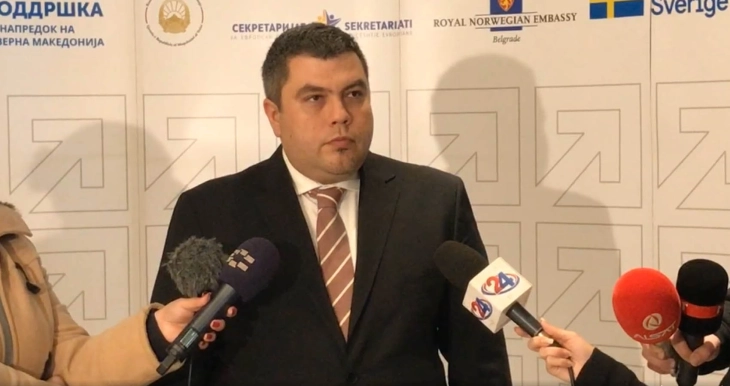Marichikj: Not far from 80 MPs required for constitutional amendments

Skopje, 17 November 2022 (MIA) – We’re in talks with all groups and with all MPs, and I’m convinced we’re not that far from 80 MPs, Deputy PM for European Affairs Bojan Marichikj said in response to a reporter's question about the constitutional amendments.
“At this stage everyone is expressing a wide range of ideas on the constitutional amendments and that’s good, but we will come at a stage when we’ll have to direct the agenda to what we really need for unblocking. Mr. Trajanov will also have the opportunity then to say under what conditions and whether he would support the constitutional amendments, but I think that apart from him, no one else has expressed reservation regarding support when it comes to the government majority. We’re in talks with all groups and with all MPs, and I’m convinced we’re not that far from 80 MPs,” Marichikj said in response to a reporter’s question about the number of MPs from the parliamentary majority that would support the constitutional amendments. As regards whether talks are underway with the opposition on this topic, the Deputy PM pointed to the leaders’ meeting held recently, adding that the aim of it was to open dialogue on the issue and such meetings will continue. “As I said, we are yet to reach out to all MPs and all parliamentary groups from both the opposition and the ruling majority in order to come up with a package that will be supported by 80 MPs,” said Marichikj. He pointed out that he doesn’t consider as pressure the visits paid by many European officials to Skopje, adding that he expects the trend to continue and he believes that such attention from the EU institutions and member states is in the country’s favor. “The process will continue and I’m convinced that it can only further develop. The German President will also visit us at the end of this month, and the trend will neither stop during next year. I believe North Macedonia should make the most of the attention it has from the European leaders, from the European institutions, as well as from the member states in order to remove all the obstacles, including the constitutional amendments and continue the negotiations after November 2023. It's no pressure at all. It’s attention that is in our favor, and yet we should be aware that the blockade is in our hands and it depends on us how we will continue and whether we will continue,” Marichikj said. In the context of the dynamics of the screening, he noted that he is quite satisfied with the course of the screening. Bilateral screening for Chapter 24 is due next week and Chapter 23 in the first week of December, which is to complete the agenda for this year. “Of course, we must maintain the pace, we must have an equal level of preparedness in all Chapters, and we are ready and insist that we answer as many questions from the EC as possible,” said Marichikj. As regards the involvement of the Parliament, he noted that at the current stage the burden is more on the Government, but the legislative house will have to act more after the screening reports arrive, i.e. the tasks that are the basis for the new reform plan. On whether any pressure is expected from Bulgaria regarding the screening, he said that every member state has the right to participate in the bilateral screening and ask questions, and regarding the freedom of association, he said the country has a good record, it has adopted a law in the Parliament, and the Ministry of Justice is already working on a new law that will provide a framework for protection against the abuse of the freedom of association due to disruption of public order. In addition, so far the Chapter doesn’t mention obligations within the agreements and he doesn’t expect them to be mentioned, because good neighborly relations and the agreements found there are not subject to the screening process. “We’re ready to explain everything that our institutions do and we’re ready to overcome any weaknesses according to European standards, but it is important to us that this process is not bilateralized or additionally burdened with bilateral issues, and I think that this is the position of several member states, if not almost all of them,” Marichikj said after Thursday’s second event on the annual 2022 EC progress report on the country “On the European path: New reforms, new opportunities”.






